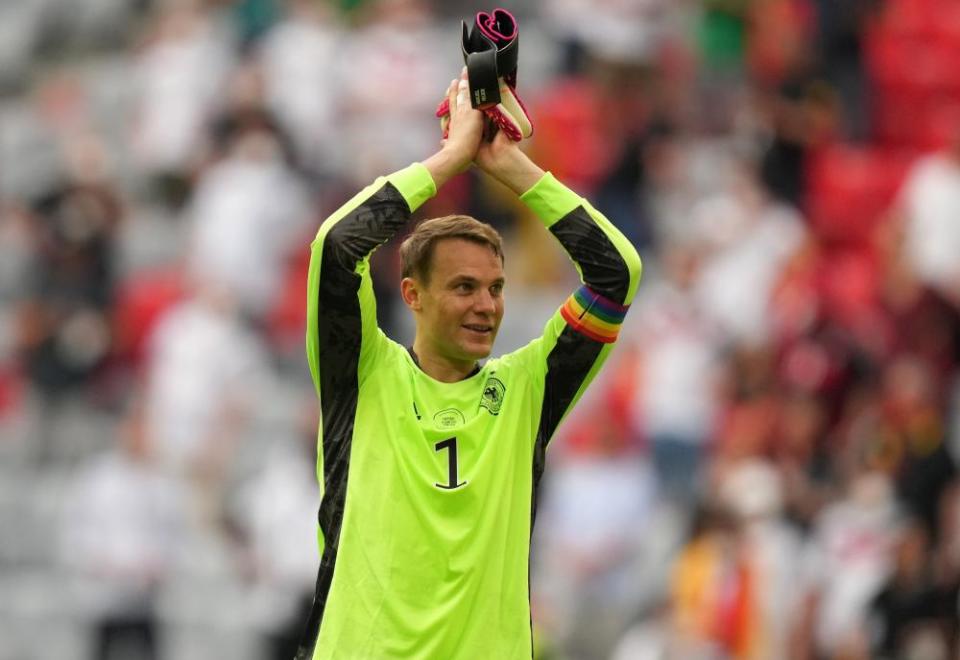Hungary’s Orbán cancels Euro 2020 trip to Munich after rainbow row

The Hungarian prime minister, Viktor Orbán, has cancelled a trip to Munich for the Euro 2020 football match between Hungary and Germany in response to widespread criticism of his government over anti-LGBTQ+ legislation it passed last week.
Orbán made his announcement hours after the European football governing body, Uefa, turned down a request from Munich city council to illuminate the Allianz Arena in rainbow colours in solidarity with the LGBTQ+ community, in particular in Hungary.
Uefa’s decision was met with a backlash across Germany and around Europe. Football clubs in cities including Cologne, Frankfurt and Berlin announced plans to light their own stadiums in rainbow colours to “fill the void”, while organisations from Munich’s fire brigade to the national rail network, Deutsche Bahn, tweeted messages of support for LGBTQ+ activists. Deutsche Bahn painted one of its trains in rainbow stripes.
Juventus and Barcelona were among other European football clubs to show their support.
Uefa has defended its decision, saying any such action would contravene its regulations as a neutrally political organisation. But days earlier it had ruled that the German team’s captain, Manuel Neuer, had not contravened those rules by wearing a rainbow armband. A German far-right politician provoked outrage after describing it as a “faggot’s armband”.
Orbán, whose government passed legislation banning gay people from featuring in school educational materials or TV shows for under-18s, appealed to the German government to respect the Uefa ban. “Whether Munich football stadium or another European stadium lights up in rainbow colours, is not a state decision,” he told the German press agency dpa.
Munich’s mayor, Dieter Reiter, on Tuesday called Uefa’s decision “shameful” and said a wind turbine located on the other side of the autobahn from the Allianz Arena would be lit up in rainbow colours instead.
The vice-president of Germany’s parliament, Claudia Roth, accused Uefa of “trying to define what the social political role of sport and sporting events are, in the manner of autocratic strongmen”. She said Uefa was undermining its own campaigns against racism and homophobia by rejecting Munich’s request.
“Which values will be left to the campaigns of Uefa against racism or homophobia in future?” she said, arguing that the governing body was in danger of “losing all credibility”.
She said it was “absurd” for Uefa to allow Neuer to continue wearing his rainbow armband while banning the rainbow illuminations.
Bild, Germany’s most widely read newspaper, said Uefa was “playing into the hands of homophobes” around the world. The tabloid accused the governing body of hypocrisy for claiming it was politically neutral while at the same time being dependent on advertising revenue from Gazprom and Qatar Airways, companies run by states in which, it pointed out, LGBTQ+ rights are virtually non-existent.
The German former football player and official Katja Kraus and the interior minister of the state of Lower Saxony, Boris Pistorius, said in a joint statement to the Neue Osnabrücker Zeitung: “Uefa looks, very regrettably, to have caved in to Viktor Orbán.”
Georginio Wijnaldum, the captain of the Dutch national team, said he would wear a rainbow armband similar to Neuer’s and bearing the slogan “one love” during their last-16 match in Budapest on 27 June. The Dutch first wore shirts bearing the same slogan last year during a warm-up session before a friendly against Spain.

Balázs Hidvéghi, a member of the European parliament and former spokesperson for Orbán’s governing party, Fidesz, accused German officials of trying to force ideological debates on to a sporting event, arguing that the law in question was about the protection of children. He denied accusations that Orbán’s government was fuelling homophobia.
“We stand ready to debate the law with those who have spoken out against it,” he told the BBC on Tuesday. “The law is strictly about the protection of children. It says that for minors under 18, sexual education has to be appropriate and what we don’t want is the intrusion of so-called LGBTQ+ lobby NGOs and pressure groups walking into kindergartens and schools to explain to children why it’s a great idea to have hormone treatments and operations to change their sex before they’re 18. These are not acceptable practices.”
The European Commission president, Ursula von der Leyen, said on Wednesday that legal proceedings would start against Hungary, calling the new law “shameful” and arguing that it went against EU values, after 14 countries issued a joint declaration voicing their “grave concern”.

 Yahoo Movies
Yahoo Movies 
